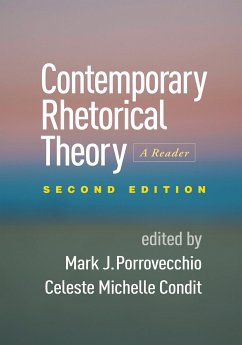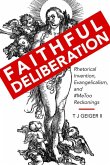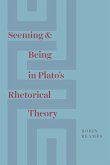Contemporary Rhetorical Theory
A Reader
Herausgeber: Porrovecchio, Mark J; Condit, Celeste Michelle
Contemporary Rhetorical Theory
A Reader
Herausgeber: Porrovecchio, Mark J; Condit, Celeste Michelle
- Broschiertes Buch
- Merkliste
- Auf die Merkliste
- Bewerten Bewerten
- Teilen
- Produkt teilen
- Produkterinnerung
- Produkterinnerung
"Our purpose here is to provide a brief introduction to the contemporary issues and concerns that have animated the work of rhetorical theorists since the late 1960s, a time of great social, political, and intellectual change. We contextualize the interests and concerns of contemporary rhetorical theorists both historically and conceptually as they have manifested themselves over the past fifty-some years"--
Andere Kunden interessierten sich auch für
![Difficult Empathy and Rhetorical Encounters Difficult Empathy and Rhetorical Encounters]() Eric LeakeDifficult Empathy and Rhetorical Encounters123,99 €
Eric LeakeDifficult Empathy and Rhetorical Encounters123,99 €![Landmark Essays on Rhetorical Genre Studies Landmark Essays on Rhetorical Genre Studies]() Landmark Essays on Rhetorical Genre Studies123,99 €
Landmark Essays on Rhetorical Genre Studies123,99 €![Rhetorical Machines Rhetorical Machines]() Rhetorical Machines30,99 €
Rhetorical Machines30,99 €![Faithful Deliberation: Rhetorical Invention, Evangelicalism, and #Metoo Reckonings Faithful Deliberation: Rhetorical Invention, Evangelicalism, and #Metoo Reckonings]() T J GeigerFaithful Deliberation: Rhetorical Invention, Evangelicalism, and #Metoo Reckonings58,99 €
T J GeigerFaithful Deliberation: Rhetorical Invention, Evangelicalism, and #Metoo Reckonings58,99 €![Seeming and Being in Plato's Rhetorical Theory Seeming and Being in Plato's Rhetorical Theory]() Robin ReamesSeeming and Being in Plato's Rhetorical Theory55,99 €
Robin ReamesSeeming and Being in Plato's Rhetorical Theory55,99 €![Resounding the Rhetorical Resounding the Rhetorical]() Byron HawkResounding the Rhetorical62,99 €
Byron HawkResounding the Rhetorical62,99 €![Rhetorical Criticism Rhetorical Criticism]() Edwin BlackRhetorical Criticism23,99 €
Edwin BlackRhetorical Criticism23,99 €-
-
-
"Our purpose here is to provide a brief introduction to the contemporary issues and concerns that have animated the work of rhetorical theorists since the late 1960s, a time of great social, political, and intellectual change. We contextualize the interests and concerns of contemporary rhetorical theorists both historically and conceptually as they have manifested themselves over the past fifty-some years"--
Hinweis: Dieser Artikel kann nur an eine deutsche Lieferadresse ausgeliefert werden.
Hinweis: Dieser Artikel kann nur an eine deutsche Lieferadresse ausgeliefert werden.
Produktdetails
- Produktdetails
- Verlag: Guilford Publications
- 2 New edition
- Seitenzahl: 627
- Erscheinungstermin: 9. August 2016
- Englisch
- Abmessung: 254mm x 179mm x 32mm
- Gewicht: 1108g
- ISBN-13: 9781462526581
- ISBN-10: 1462526586
- Artikelnr.: 44215092
- Herstellerkennzeichnung
- Libri GmbH
- Europaallee 1
- 36244 Bad Hersfeld
- gpsr@libri.de
- Verlag: Guilford Publications
- 2 New edition
- Seitenzahl: 627
- Erscheinungstermin: 9. August 2016
- Englisch
- Abmessung: 254mm x 179mm x 32mm
- Gewicht: 1108g
- ISBN-13: 9781462526581
- ISBN-10: 1462526586
- Artikelnr.: 44215092
- Herstellerkennzeichnung
- Libri GmbH
- Europaallee 1
- 36244 Bad Hersfeld
- gpsr@libri.de
Mark J. Porrovecchio, PhD, is Director of Forensics and Associate Professor in the Department of Speech Communication at Oregon State University. He studies pragmatism and the history of speech communication and rhetoric. His work has appeared in the Western Journal of Communication, Etica & Politica, and Transactions of the Charles S. Peirce Society. Dr. Porrovecchio is the editor of Reengaging the Prospects of Rhetoric and author of F. C. S. Schiller and the Dawn of Pragmatism. Celeste Michelle Condit, PhD, is Distinguished Research Professor in the Department of Communication Studies at the University of Georgia. She studies rhetorical theory and criticism, especially in the areas of feminism, racism, rhetoric of science (genetics), and health communication, and has served as coeditor of the journals Women's Studies in Communication and Critical Studies in Media Communication. Dr. Condit is a National Communication Association Distinguished Scholar.
Introduction, Mark J. Porrovecchio & Celeste Michelle Condit
I. What Can a "Rhetoric" Be?
Toward a Sophistic Definition of Rhetoric, John Poulakos
Status, Marginality, and Rhetorical Theory, Robert Hariman
The Habitation of Rhetoric, Michael Leff
Text, Context, and the Fragmentation of Contemporary Culture, Michael
Calvin McGee Practicing the Arts of Rhetoric: Tradition and Invention,
Thomas Farrell
Beyond Persuasion: A Proposal for an Invitational Rhetoric, Sonja K. Foss &
Cindy L. Griffin
Digital Rhetoric: Toward an Integrated Theory, James P. Zappen
II. Rhetoric and Epistemology
On Viewing Rhetoric as Epistemic, Robert L. Scott
Knowledge, Consensus, and Rhetorical Theory, Thomas Farrell
Rhetorical Perspectivism, Richard A. Cherwitz & James W. Hikins
Rhetoric and Its Double: Reflections of the Rhetorical Turn in the Human
Sciences, Dilip Parameshwar Gaonkar
What Do You Mean, Rhetoric is Epistemic?, William D. Harpine
III. The Evolution of the Rhetorical Situation
The Rhetorical Situation, Lloyd F. Bitzer
The Myth of the Rhetorical Situation, Richard E. Vatz
Rethinking the Rhetorical Situation from within the Thematic of Différance,
Barbara A. Biesecker
Unframing Models of Public Distribution: From Rhetorical Situation to
Rhetorical Ecologies, Jenny Edbauer
IV. Perspectives on Publics
The Personal, Technical, and Public Spheres of Argument: A Speculative
Inquiry in the Art of Public Deliberation, G. Thomas Goodnight
Narration as Human Communication Paradigm: The Case of Public Moral
Argument, Walter R. Fisher
Crafting Virtue: The Rhetorical Construction of Public Morality, Celeste
Michelle Condit
The Polis as Rhetorical Community, Carolyn R. Miller
Publics and Counterpublics (abbreviated version), Michael Warner
Public Identity and Collective Memory in U.S. Iconic Photography: The Image
of "Accidental Napalm," Robert Hariman & John Louis Lucaites
V. The Persistence of Persona(e) in Rhetorical Theory
The Second Persona, Edwin Black
The Third Persona: An Ideological Turn in Rhetorical Theory, Philip Wander
The Null Persona: Race and the Rhetoric of Silence in the Uprising of '34,
Dana L. Cloud
Pink Herring and the Fourth Persona: J. Edgar Hoover's Sex Crime Panic,
Charles E. Morris III
VI. Rhetoric and the Problems of Political Change
The Rhetoric of Women's Liberation: An Oxymoron, Karlyn Kohrs Campbell
The "Ideograph": A Link Between Rhetoric and Ideology, Michael Calvin McGee
Constitutive Rhetoric: The Case of the Peuple Québécois, Maurice Charland
Critical Rhetoric: Theory and Praxis, Raymie E. McKerrow
Critical Rhetoric as Political Discourse, John M. Murphy
Imagining in the Public Sphere, Robert Asen
VII. Rhetoric and the Mass Media
Burke's Representative Anecdote as a Method in Media Criticism, Barry
Brummett
The Rhetorical Limits of Polysemy, Celeste Michelle Condit
Pranking Rhetoric: "Culture Jamming" as Media Activism, Christine Harold
A Virtual Death and a Real Dilemma: Identity, Trust, and Community in
Cyberspace, John W. Jordan
An Epideictic Dimension of Symbolic Violence in Disney's Beauty and the
Beast: Inter-Generational Lessons in Romanticizing and Tolerating Intimate
Partner Violence, Kathryn M. Olson
VIII. Alternatives to the Rhetorical Tradition
Cultures of Discourse: Marxism and Rhetorical Theory, James Arnt Aune
Disciplining the Feminine, Carole Blair, Julie R. Brown, & Leslie A. Baxter
Postcolonial Interventions in the Rhetorical Canon: An "Other" View, Raka
Shome
Refiguring Fantasy: Imagination and Its Decline in U.S. Rhetorical Studies,
Joshua Gunn Pure Persuasion: A Case Study of Nüshu or "Women's Script"
Discourses, Lin-Lee Lee
Epilogue: Contributions from Rhetorical Theory, Mark J. Porrovecchio &
Celeste Michelle Condit
I. What Can a "Rhetoric" Be?
Toward a Sophistic Definition of Rhetoric, John Poulakos
Status, Marginality, and Rhetorical Theory, Robert Hariman
The Habitation of Rhetoric, Michael Leff
Text, Context, and the Fragmentation of Contemporary Culture, Michael
Calvin McGee Practicing the Arts of Rhetoric: Tradition and Invention,
Thomas Farrell
Beyond Persuasion: A Proposal for an Invitational Rhetoric, Sonja K. Foss &
Cindy L. Griffin
Digital Rhetoric: Toward an Integrated Theory, James P. Zappen
II. Rhetoric and Epistemology
On Viewing Rhetoric as Epistemic, Robert L. Scott
Knowledge, Consensus, and Rhetorical Theory, Thomas Farrell
Rhetorical Perspectivism, Richard A. Cherwitz & James W. Hikins
Rhetoric and Its Double: Reflections of the Rhetorical Turn in the Human
Sciences, Dilip Parameshwar Gaonkar
What Do You Mean, Rhetoric is Epistemic?, William D. Harpine
III. The Evolution of the Rhetorical Situation
The Rhetorical Situation, Lloyd F. Bitzer
The Myth of the Rhetorical Situation, Richard E. Vatz
Rethinking the Rhetorical Situation from within the Thematic of Différance,
Barbara A. Biesecker
Unframing Models of Public Distribution: From Rhetorical Situation to
Rhetorical Ecologies, Jenny Edbauer
IV. Perspectives on Publics
The Personal, Technical, and Public Spheres of Argument: A Speculative
Inquiry in the Art of Public Deliberation, G. Thomas Goodnight
Narration as Human Communication Paradigm: The Case of Public Moral
Argument, Walter R. Fisher
Crafting Virtue: The Rhetorical Construction of Public Morality, Celeste
Michelle Condit
The Polis as Rhetorical Community, Carolyn R. Miller
Publics and Counterpublics (abbreviated version), Michael Warner
Public Identity and Collective Memory in U.S. Iconic Photography: The Image
of "Accidental Napalm," Robert Hariman & John Louis Lucaites
V. The Persistence of Persona(e) in Rhetorical Theory
The Second Persona, Edwin Black
The Third Persona: An Ideological Turn in Rhetorical Theory, Philip Wander
The Null Persona: Race and the Rhetoric of Silence in the Uprising of '34,
Dana L. Cloud
Pink Herring and the Fourth Persona: J. Edgar Hoover's Sex Crime Panic,
Charles E. Morris III
VI. Rhetoric and the Problems of Political Change
The Rhetoric of Women's Liberation: An Oxymoron, Karlyn Kohrs Campbell
The "Ideograph": A Link Between Rhetoric and Ideology, Michael Calvin McGee
Constitutive Rhetoric: The Case of the Peuple Québécois, Maurice Charland
Critical Rhetoric: Theory and Praxis, Raymie E. McKerrow
Critical Rhetoric as Political Discourse, John M. Murphy
Imagining in the Public Sphere, Robert Asen
VII. Rhetoric and the Mass Media
Burke's Representative Anecdote as a Method in Media Criticism, Barry
Brummett
The Rhetorical Limits of Polysemy, Celeste Michelle Condit
Pranking Rhetoric: "Culture Jamming" as Media Activism, Christine Harold
A Virtual Death and a Real Dilemma: Identity, Trust, and Community in
Cyberspace, John W. Jordan
An Epideictic Dimension of Symbolic Violence in Disney's Beauty and the
Beast: Inter-Generational Lessons in Romanticizing and Tolerating Intimate
Partner Violence, Kathryn M. Olson
VIII. Alternatives to the Rhetorical Tradition
Cultures of Discourse: Marxism and Rhetorical Theory, James Arnt Aune
Disciplining the Feminine, Carole Blair, Julie R. Brown, & Leslie A. Baxter
Postcolonial Interventions in the Rhetorical Canon: An "Other" View, Raka
Shome
Refiguring Fantasy: Imagination and Its Decline in U.S. Rhetorical Studies,
Joshua Gunn Pure Persuasion: A Case Study of Nüshu or "Women's Script"
Discourses, Lin-Lee Lee
Epilogue: Contributions from Rhetorical Theory, Mark J. Porrovecchio &
Celeste Michelle Condit
Introduction, Mark J. Porrovecchio & Celeste Michelle Condit
I. What Can a "Rhetoric" Be?
Toward a Sophistic Definition of Rhetoric, John Poulakos
Status, Marginality, and Rhetorical Theory, Robert Hariman
The Habitation of Rhetoric, Michael Leff
Text, Context, and the Fragmentation of Contemporary Culture, Michael
Calvin McGee Practicing the Arts of Rhetoric: Tradition and Invention,
Thomas Farrell
Beyond Persuasion: A Proposal for an Invitational Rhetoric, Sonja K. Foss &
Cindy L. Griffin
Digital Rhetoric: Toward an Integrated Theory, James P. Zappen
II. Rhetoric and Epistemology
On Viewing Rhetoric as Epistemic, Robert L. Scott
Knowledge, Consensus, and Rhetorical Theory, Thomas Farrell
Rhetorical Perspectivism, Richard A. Cherwitz & James W. Hikins
Rhetoric and Its Double: Reflections of the Rhetorical Turn in the Human
Sciences, Dilip Parameshwar Gaonkar
What Do You Mean, Rhetoric is Epistemic?, William D. Harpine
III. The Evolution of the Rhetorical Situation
The Rhetorical Situation, Lloyd F. Bitzer
The Myth of the Rhetorical Situation, Richard E. Vatz
Rethinking the Rhetorical Situation from within the Thematic of Différance,
Barbara A. Biesecker
Unframing Models of Public Distribution: From Rhetorical Situation to
Rhetorical Ecologies, Jenny Edbauer
IV. Perspectives on Publics
The Personal, Technical, and Public Spheres of Argument: A Speculative
Inquiry in the Art of Public Deliberation, G. Thomas Goodnight
Narration as Human Communication Paradigm: The Case of Public Moral
Argument, Walter R. Fisher
Crafting Virtue: The Rhetorical Construction of Public Morality, Celeste
Michelle Condit
The Polis as Rhetorical Community, Carolyn R. Miller
Publics and Counterpublics (abbreviated version), Michael Warner
Public Identity and Collective Memory in U.S. Iconic Photography: The Image
of "Accidental Napalm," Robert Hariman & John Louis Lucaites
V. The Persistence of Persona(e) in Rhetorical Theory
The Second Persona, Edwin Black
The Third Persona: An Ideological Turn in Rhetorical Theory, Philip Wander
The Null Persona: Race and the Rhetoric of Silence in the Uprising of '34,
Dana L. Cloud
Pink Herring and the Fourth Persona: J. Edgar Hoover's Sex Crime Panic,
Charles E. Morris III
VI. Rhetoric and the Problems of Political Change
The Rhetoric of Women's Liberation: An Oxymoron, Karlyn Kohrs Campbell
The "Ideograph": A Link Between Rhetoric and Ideology, Michael Calvin McGee
Constitutive Rhetoric: The Case of the Peuple Québécois, Maurice Charland
Critical Rhetoric: Theory and Praxis, Raymie E. McKerrow
Critical Rhetoric as Political Discourse, John M. Murphy
Imagining in the Public Sphere, Robert Asen
VII. Rhetoric and the Mass Media
Burke's Representative Anecdote as a Method in Media Criticism, Barry
Brummett
The Rhetorical Limits of Polysemy, Celeste Michelle Condit
Pranking Rhetoric: "Culture Jamming" as Media Activism, Christine Harold
A Virtual Death and a Real Dilemma: Identity, Trust, and Community in
Cyberspace, John W. Jordan
An Epideictic Dimension of Symbolic Violence in Disney's Beauty and the
Beast: Inter-Generational Lessons in Romanticizing and Tolerating Intimate
Partner Violence, Kathryn M. Olson
VIII. Alternatives to the Rhetorical Tradition
Cultures of Discourse: Marxism and Rhetorical Theory, James Arnt Aune
Disciplining the Feminine, Carole Blair, Julie R. Brown, & Leslie A. Baxter
Postcolonial Interventions in the Rhetorical Canon: An "Other" View, Raka
Shome
Refiguring Fantasy: Imagination and Its Decline in U.S. Rhetorical Studies,
Joshua Gunn Pure Persuasion: A Case Study of Nüshu or "Women's Script"
Discourses, Lin-Lee Lee
Epilogue: Contributions from Rhetorical Theory, Mark J. Porrovecchio &
Celeste Michelle Condit
I. What Can a "Rhetoric" Be?
Toward a Sophistic Definition of Rhetoric, John Poulakos
Status, Marginality, and Rhetorical Theory, Robert Hariman
The Habitation of Rhetoric, Michael Leff
Text, Context, and the Fragmentation of Contemporary Culture, Michael
Calvin McGee Practicing the Arts of Rhetoric: Tradition and Invention,
Thomas Farrell
Beyond Persuasion: A Proposal for an Invitational Rhetoric, Sonja K. Foss &
Cindy L. Griffin
Digital Rhetoric: Toward an Integrated Theory, James P. Zappen
II. Rhetoric and Epistemology
On Viewing Rhetoric as Epistemic, Robert L. Scott
Knowledge, Consensus, and Rhetorical Theory, Thomas Farrell
Rhetorical Perspectivism, Richard A. Cherwitz & James W. Hikins
Rhetoric and Its Double: Reflections of the Rhetorical Turn in the Human
Sciences, Dilip Parameshwar Gaonkar
What Do You Mean, Rhetoric is Epistemic?, William D. Harpine
III. The Evolution of the Rhetorical Situation
The Rhetorical Situation, Lloyd F. Bitzer
The Myth of the Rhetorical Situation, Richard E. Vatz
Rethinking the Rhetorical Situation from within the Thematic of Différance,
Barbara A. Biesecker
Unframing Models of Public Distribution: From Rhetorical Situation to
Rhetorical Ecologies, Jenny Edbauer
IV. Perspectives on Publics
The Personal, Technical, and Public Spheres of Argument: A Speculative
Inquiry in the Art of Public Deliberation, G. Thomas Goodnight
Narration as Human Communication Paradigm: The Case of Public Moral
Argument, Walter R. Fisher
Crafting Virtue: The Rhetorical Construction of Public Morality, Celeste
Michelle Condit
The Polis as Rhetorical Community, Carolyn R. Miller
Publics and Counterpublics (abbreviated version), Michael Warner
Public Identity and Collective Memory in U.S. Iconic Photography: The Image
of "Accidental Napalm," Robert Hariman & John Louis Lucaites
V. The Persistence of Persona(e) in Rhetorical Theory
The Second Persona, Edwin Black
The Third Persona: An Ideological Turn in Rhetorical Theory, Philip Wander
The Null Persona: Race and the Rhetoric of Silence in the Uprising of '34,
Dana L. Cloud
Pink Herring and the Fourth Persona: J. Edgar Hoover's Sex Crime Panic,
Charles E. Morris III
VI. Rhetoric and the Problems of Political Change
The Rhetoric of Women's Liberation: An Oxymoron, Karlyn Kohrs Campbell
The "Ideograph": A Link Between Rhetoric and Ideology, Michael Calvin McGee
Constitutive Rhetoric: The Case of the Peuple Québécois, Maurice Charland
Critical Rhetoric: Theory and Praxis, Raymie E. McKerrow
Critical Rhetoric as Political Discourse, John M. Murphy
Imagining in the Public Sphere, Robert Asen
VII. Rhetoric and the Mass Media
Burke's Representative Anecdote as a Method in Media Criticism, Barry
Brummett
The Rhetorical Limits of Polysemy, Celeste Michelle Condit
Pranking Rhetoric: "Culture Jamming" as Media Activism, Christine Harold
A Virtual Death and a Real Dilemma: Identity, Trust, and Community in
Cyberspace, John W. Jordan
An Epideictic Dimension of Symbolic Violence in Disney's Beauty and the
Beast: Inter-Generational Lessons in Romanticizing and Tolerating Intimate
Partner Violence, Kathryn M. Olson
VIII. Alternatives to the Rhetorical Tradition
Cultures of Discourse: Marxism and Rhetorical Theory, James Arnt Aune
Disciplining the Feminine, Carole Blair, Julie R. Brown, & Leslie A. Baxter
Postcolonial Interventions in the Rhetorical Canon: An "Other" View, Raka
Shome
Refiguring Fantasy: Imagination and Its Decline in U.S. Rhetorical Studies,
Joshua Gunn Pure Persuasion: A Case Study of Nüshu or "Women's Script"
Discourses, Lin-Lee Lee
Epilogue: Contributions from Rhetorical Theory, Mark J. Porrovecchio &
Celeste Michelle Condit








